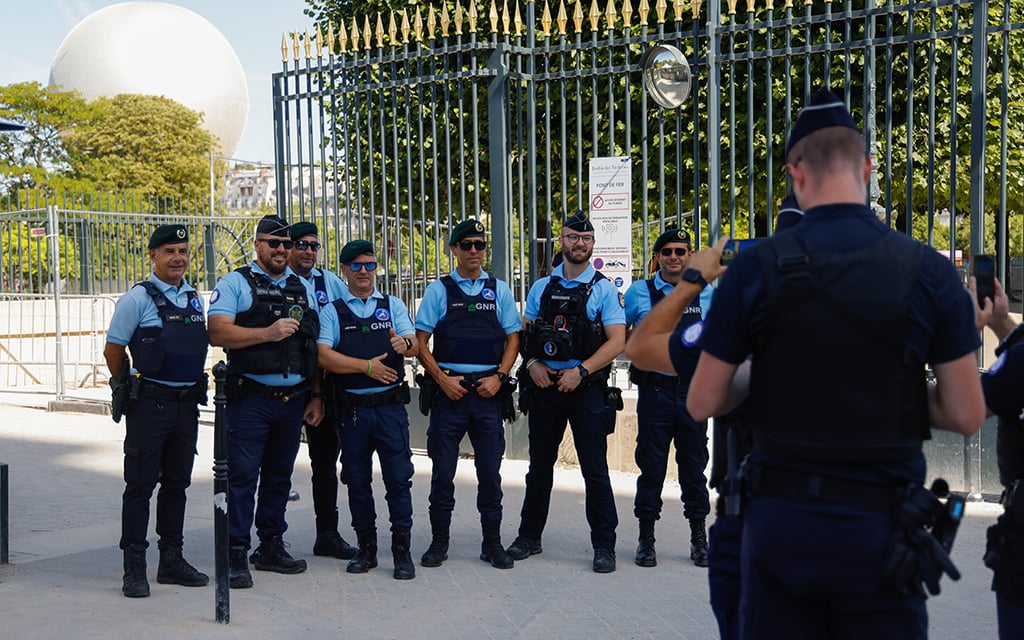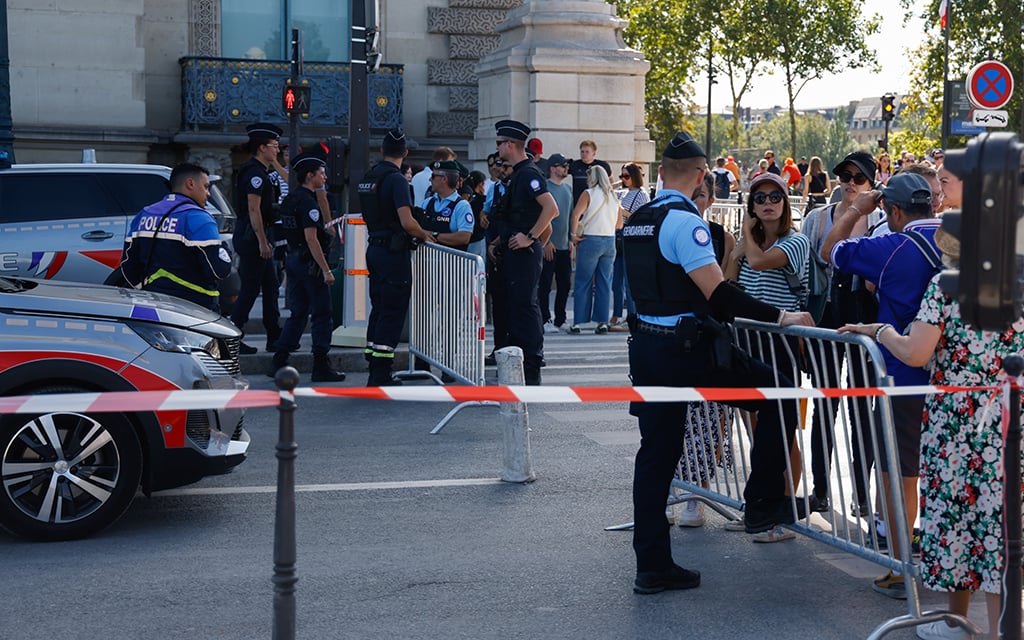
Members of the National Gendarmerie stand near the Olympic Cauldron outside of The Louvre in Paris. The city put many resources into making sure it had proper security for the Olympic Games. (Photo by Sydney Lovan/Special for Cronkite News)
PARIS – Walking down the canals and streets of Paris, the Summer Olympics’ presence is felt everywhere. Multi-colored signs say “Paris 2024,” fan festivals buzz with thousands of people and stadiums at the feet of iconic Parisian architecture highlight the energy of the Games.
But that might not be the first thing visitors notice. Instead, it’s the walls of metal fences built to guide traffic and block trespassers from event sites, or the sirens from a line of police vehicles rushing through the narrow streets. They’ll for sure see the lines of officers around the city armed with assault rifles.
While the Summer Olympics are celebrated as one of the world’s most unifying events, they are also one of the most extensive security operations in the world, as the risks around the massive gathering can’t be understated. Right now, Paris is the most secure place in the world. In four years, Los Angeles will be challenged to do the same with its own challenges already in place.
“It’s a wall of steel around some parts of the city,” said David Dunn, a University of Birmingham political sciences and international studies professor. “(City officials) deploy large numbers of troops and police onto the streets as preparation, a deterrent and a reassurance to the population that they are being prepared for.”
While the Los Angeles Olympics are four years off, preparations have been underway since the IOC announced L.A. as the host city in 2017. Part of that preparation is understanding how to secure the biggest sporting event in the world, which will be completely different from how France secured the 2024 Games.
“This event poses unprecedented challenges in terms of securing areas, protecting people and property, accommodating the public and, where necessary, victims, as well as transport,” Paris Prefecture de Police communications said in a written statement. “The State, the City of Paris, the arrondissements, the local authorities concerned and the organizer have been working together for a long time to meet these challenges.”
City and state organizers were able to anticipate some of those challenges long before the games even started. Paris is very compactly laid out. Its streets are narrow, and it has one of the most effective subway systems in any city in the world. The city covers about 41 square miles. In comparison, Los Angeles’ area is 503 square miles. This, along with other sites used for the games like Versaille and stadiums in Lille and Lyon, makes securing the Games difficult.
Paris hosts nearly 10,000 athletes, foreign delegations,and an expected 15.3 million tourists during the games. At least 30,000 officers, including officers from 44 countries, are allocated daily to city security around the games. The security doesn’t stop at police officers, Paris is also equipped with 20,000 security guards and 10,000 Operation “Sentinelle” soldiers, who were deployed after the 2015 terrorist attacks.
However, there are some variables that Paris can’t control. When given the games in 2017, Paris had no idea there would be two major conflicts on their continent. Russia’s invasion of Ukraine and the Israel-Gaza conflict make securing this Olympics an even bigger operation.
“The Paris organizers had the challenge of dealing with making the games during the most difficult international set of geopolitical circumstances faced by any host city in modern times,” Dunn said.

National Gendarmerie and French police talk to Olympic fans as they set up road blockades for the marathon course in Paris. (Photo by Sydney Lovan/Special for Cronkite News)
International conflicts have proven to make security at these games even more important. In addition to wars outside its borders, Paris has been dealing with the political unrest of the recent June elections. All of this has led to Paris tightening its security even more than initially expected. During the days leading up to the opening ceremony, multiple places, including the banks of the Seine and the Eiffel Tower, were cut off from most citizens.
“The city is made of metal,” local Natalie Koronda said. “It’s not the City of Light anymore.”
The city opened up more following the opening ceremony, but fencing and firearms are still on every corner. However, it seems to have paid off for Paris. Minimal political protests have surfaced during the games, and the only public major security incident was arson at the Gare du Nord train station the the night before the opening ceremony. No party, domestic or foreign, has claimed responsibility for it yet.
And here, seeing all the metal, security and preparation, are teams of the LA28 group, including the public safety and operations teams.
“The Olympic and Paralympic Games Paris 2024 are the opportunity for LA28 staff to see a Summer Games operate at full capacity prior to the 2028 Games,” LA28 communications associate Natalie McGiffert said in an email.
Mayor of Los Angeles Karen Bass has also attended the Games. Paris and Los Angeles have worked together since they were awarded the Olympics.
“We decided to win together,” Mayor of Paris Anne Hidalgo said. “Everything we are going to do in Paris, we are also going to do in Los Angeles. We are going to look at it from the very challenging perspective of Los Angeles, and we are working with (them).”
Although they are working together, there aren’t many similarities between securing Paris and securing L.A. Los Angeles is more than 12 times bigger than Paris and has less than half the number of subway lines compared to Paris (LA has six, Paris has 16). The sheer size of L.A. creates a different monster for the IOC and LA28 to tackle.
“The greater the geographic area, the more points of vulnerability there might be for malicious actors to create chaos or disruption,” said Brian Gerber, the associate professor and co-director for ASU’s Center for Emergency Management and Homeland Security. “That increases the cost and complexity of maintaining safety for the event.”
The transportation differences are very notable. L.A. relies primarily on automobiles more than Paris does. Research done in 2019 showed that 80% to 90% of L.A. residents owned a car, while approximately 37% of Parisians did. As a much less walkable and bikeable city, L.A. will have to worry about basic traffic safety on the roads, along with pedestrian safety, more than Paris has.
While also sending teams to Paris, LA28 is already taking steps toward organizing its security for the 2028 Olympics. Earlier this year, the federal government designated the 2028 Games a National Special Security Event, the earliest the U.S. has ever given that designation in history. The United States will also host global events leading up to the 2028 Games, such as this summer’s Copa America and the 2026 FIFA World Cup. However, neither of those two events happens in one city.
L.A. won’t be alone in its efforts. While no one knows what the geopolitical landscape will look like in four years, the U.S. has alliances worldwide, such as NATO and Five Eyes nations, from which the country may draw intelligence and resources when the time comes. Unlike Paris, Los Angeles is much more isolated from the world than Paris, which lies in the heart of Europe.
“The combination of those kinds of partnerships, intelligence sharing and military alliances absolutely will come into play,” Gerber said. “There will be a very concerted effort to monitor any potential human threats, specifically terrorism, to prepare for.”
According to McGiffert, Los Angeles is still in the early stages of setting up the games. Therefore, LA28 still hasn’t finalized the venue assignments and cannot describe the overarching security plan.
As Hidalgo said, the city will have help from its predecessors. Although the two cities may have many differences, Paris and L.A. will work together to tackle issues such as homelessness so that the 2028 Games can be as secure as the 2024 Games.
“It’s part of the issues that we are working with on Mayor Bass, and we are going to continue to over the next two years to support help,” Hidalgo said. “L.A. is a much bigger city than Paris. There are more than 40,000 homeless in L.A. on the street. Here in Paris, on the streets, we have 3,600 people who still need shelter. So we are on different scales, but we want to share our experience and support Los Angeles.”
With the help of Paris, international allies and the U.S. government, Los Angeles believes it will be ready and secure in 2028. However, it will be unlike anything the U.S. has seen before. In a city less traversable than Paris, one that is much larger and in a different region of the world, LA28 and the the IOC will have to take a different approach to their security plan. But that’s why LA28 is in Paris: to learn what they can do before they are in the spotlight for four years.
“Everything else pales in comparison,” Dunn said. “Therefore, what (Los Angeles) needs to do is make sure to devote the resources, preparation and planning into it and the learning involved to make sure that (the Olympics) are remembered for the opening ceremony and the medals won, and nothing else.”